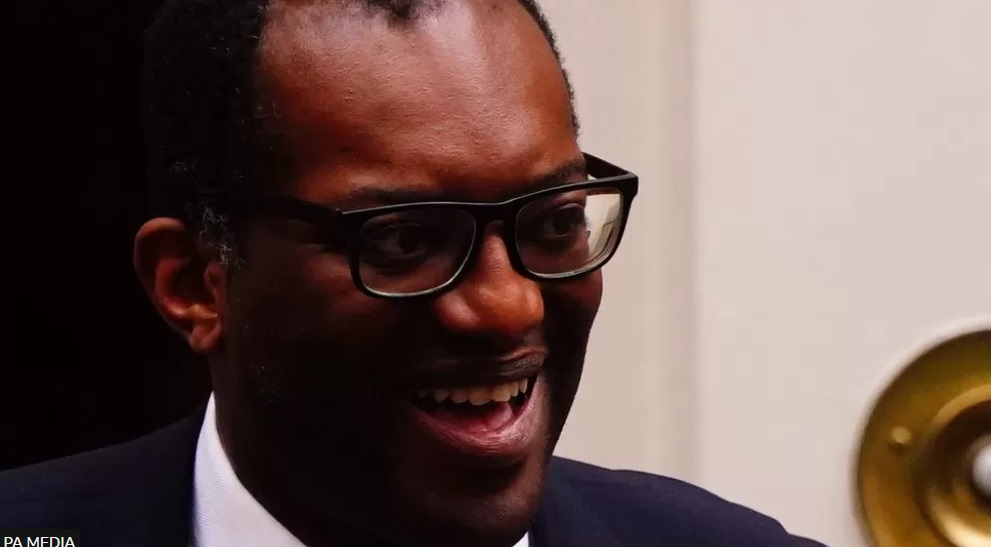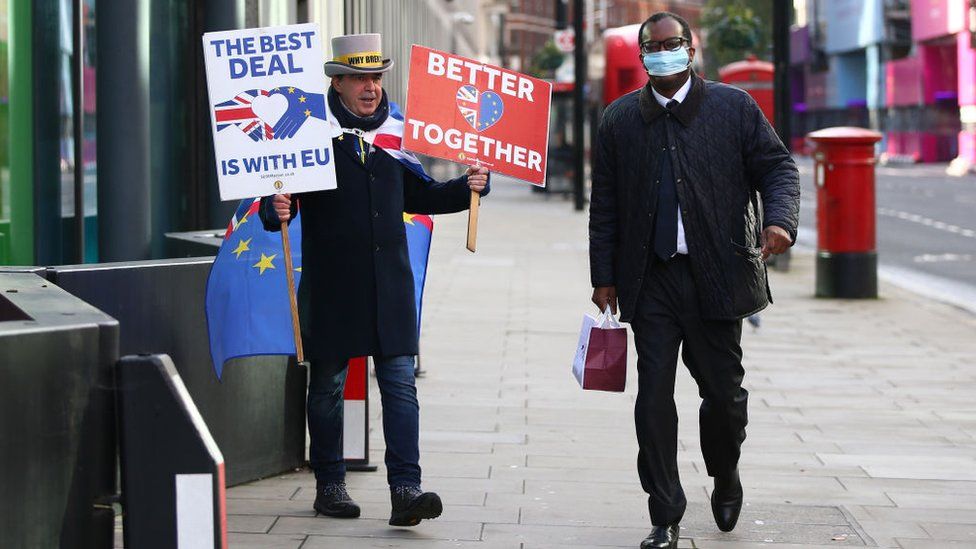
Who is Kwasi Kwarteng? The chancellor out after 38 days
Kwasi Kwarteng has been sacked as chancellor and replaced by Jeremy Hunt after his mini-budget resulted in financial turbulence and a revolt from Tory MPs.
He has become Britain's second shortest-serving chancellor, lasting just 38 days in the role.
The long-time ally of Prime Minister Liz Truss, seen as her political soulmate, was appointed to the role on 6 September.
Speaking before Mr Kwarteng became chancellor, one friend told the Times that he and Ms Truss were a bit like "Batman and Robin", adding: "They are both slight social misfits, amiable geeks, and have strong views which are in tune with each other."
He took over at Number 11 Downing Street at a critical time for the UK economy, with millions looking to him for help with soaring winter energy bills.
An Old Etonian who became the first black Conservative cabinet minister in 2021, he read classics and history at Trinity College, Cambridge, and has a PhD in economic history. He is also a past winner of notoriously tough BBC quiz show University Challenge.
Kwasi Kwarteng: The basics
Age: 47
Place of birth: East London
Education: Trinity College, Cambridge and Harvard University
Family: Married to solicitor Harriet Edwards with one daughter
Parliamentary constituency: Spelthorne (Surrey)
Mr Kwarteng's parents came to the UK from Ghana as students in the 1960s. He was born in East London in 1975, the same year as Ms Truss.
The Church was a strong part of his mother's life and she was a lifelong Conservative voter.
He was just three years old when Margaret Thatcher came to power, and she would remain prime minister until his GCSE year. He has said in the past that his mother deeply admired Mrs Thatcher as someone "who wanted to rely on their own efforts" and has described himself as a "pragmatic Thatcherite".
He attended the exclusive private school Eton College after winning a scholarship there, and went on to graduate with a double first from Cambridge University in classics and history.
One well-known anecdote about the young Kwasi Kwarteng harks back to his admissions interview for Trinity College. The self-confident 17-year-old told the tutor, who had arrived late and hadn't conducted many of these interviews before: "Don't worry, sir - I'm sure you'll do very well."
He was part of the Cambridge team which won University Challenge in 1995, although he generated headlines for uttering a swearword after he buzzed in and forgot the answer to a question.
Kwasi Kwarteng appeared in the winning team for Trinity College, Cambridge, on University Challenge in 1994-95
He attended Harvard University in the United States on a Kennedy Scholarship, before returning to the University of Cambridge to complete a PhD in economic history in 2000.
During his second stint at the university, Tristram Hunt, the former Labour MP and now head of the V&A Museum, joked that then roommate Mr Kwarteng was "quite ungovernable and dishevelled".
He worked as a columnist for the Daily Telegraph and a financial analyst at banks including JP Morgan in the City of London and got involved in Conservative politics as chairman of the Bow Group think tank.
He has remarked that "politics was always something I was drawn to", and he made his first attempt to become an MP in 2005. He stood as the Conservative candidate for Brent East at the general election, but came third. There was also an unsuccessful run for the London Assembly in 2008.
However, he became part of the "class of 2010", a cohort of politicians entering Westminster for the first time that year. He was elected as MP for Spelthorne in Surrey and entered Parliament the same time as future colleagues Ms Truss, Priti Patel and Sajid Javid.
His maiden speech in the House of Commons came with some comments he described as "controversial", when he used the opportunity to criticise the former Labour government led by Gordon Brown and how it tackled the 2008 financial crisis.
"They have not once accepted any blame for what happened and they seem to think that we can just sail on as before," he said, also setting out the view that "wealth creation is the most important element in getting us out of this recession".
Although Mr Kwarteng was tipped to become the Conservatives' first black cabinet member as early as 2006, he spent eight years as a constituency MP before he became a minister.
He backed Leave in the 2016 Brexit referendum, and in 2017 became a ministerial aide to the then Chancellor Philip Hammond, before becoming a junior minister in the Department for Exiting the European Union.
Mr Kwarteng also co-authored the book Britannia Unchained with several Tory MPs, including Ms Truss. In the 2012 text, they claimed: "Once they enter the workplace, the British are among the worst idlers in the world." He has since distanced himself from this view.
Mr Kwarteng has used his spare time to write several books and pamphlets on topics from Mrs Thatcher's final six months in office to the British Empire and its legacy.
He has argued that "the debate around Black Lives Matter and imperialism or colonialism has a cartoon-like view of history", and has said he thinks that view is true on both sides of the issue.

Mr Kwarteng was a supporter of Boris Johnson who put him on the ministerial fast-track as energy minister in 2019.
He worked there for more than a year before becoming business secretary 18 months later.
The ascent has been described as a "reward" for his backing of Mr Johnson during the race for party leadership.
The realities of the pandemic and the soaring cost of energy, however, meant that his views on state intervention in industry moderated.
"There's nothing [better] to convert someone from being a radical free marketeer to seeing the virtues of government action than making them an energy minister," he said at a 2019 Conservative party conference event.
That same year, he married solicitor Harriet Edwards, having previously dated former Home Secretary Amber Rudd.
His political partnership with Ms Truss, a fellow member of the 2010 intake of MPs, paid dividends when she asked her close ally to serve as chancellor.
But the mini-budget he unveiled on 23 September spooked financial markets and prompted a drop in the value of the pound.
Amid warnings from the International Monetary Fund (IMF), the Bank of England stepped in to buy government bonds in a bid to stabilise their value.
The chancellor said he had listened to criticism - including from within his party - and there was a U-turn on a plan to abolish the 45p rate of income tax for top earners.
But market turbulence continued, causing speculation that the government would announce a further reversal on its tax-cutting plans.
The day before his ejection from Number 11 Downing Street, Mr Kwarteng said "our position hasn't changed" - and that he would "absolutely" still be in his job a month later.
